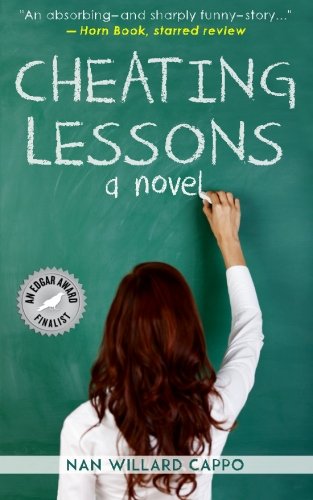There is a young adult novel sitting on my desk right now waiting for a verdict. The author of the novel, Nan Willard Cappo, has written an interesting story.
Cheating Lessons is about a high school student named Bernadette Terrell. She’s not a very likable character actually—not someone I would have been friends with at the beginning of the story. She’s sassy, overconfident, and sees herself as better than other people. The relationship between her and her mom is one that made me cringe each time they interacted. The plot of the story centers around Bernadette and three other debate students who qualify to take part in the classics bowl. Their goal is to beat their biggest rival, a private school named Pinehurst.
 Not only does the main character’s attitude and actions make me cringe, but the story does as well because it broaches several subjects that I am uncomfortable with—cheating, teachers lying, and inappropriate relationships between students and teachers. But, then the question I am faced with is—would I choose to have my tween daughters read this book? I realize that just because I am uncomfortable with some of the hard parts of the world we live in, doesn’t mean that it isn’t important for my daughters to know about those parts of the world. The question isn’t if or yes/no—it’s how and when.
Not only does the main character’s attitude and actions make me cringe, but the story does as well because it broaches several subjects that I am uncomfortable with—cheating, teachers lying, and inappropriate relationships between students and teachers. But, then the question I am faced with is—would I choose to have my tween daughters read this book? I realize that just because I am uncomfortable with some of the hard parts of the world we live in, doesn’t mean that it isn’t important for my daughters to know about those parts of the world. The question isn’t if or yes/no—it’s how and when.
Over the years, I have come to conclude that there is a fine line between exposing students to ideas and planting ideas in their heads. For a middle school girl to read this book, I think it would plant ideas about identity, friendship, teaching, how it’s appropriate to view teachers (giving permission to lustful and disrespectful thoughts). But, in the case of high schoolers, I think an older girl would be able to filter out the stuff that made me cringe about this book. I realize, too, that many teenagers relate to their parents the way Bernadette does in this book. I don’t relate this way to my girls and I didn’t relate this way to my mom when I was a teenager. Our culture assumes this is normal across the board and it isn’t. Teenagers don’t have to view their parents the way Bernadette does. I believe that the seeds are planted in tweens' minds that parents are against their kids—not for them. What we read and what we feed our minds shapes our thought life and ultimately how we treat and react to the world around us.
In my mind, this book is appropriate for high schoolers—not middle schoolers. I read one review which declared this book not to be YA fiction and to be appropriate for children. NO WAY, JOSE! This is not a book I would give my middle school daughters. I might give it to them later in high school, have them read portions of the book and talk to them about it.
This book is one I’d recommend to public school students in high school. I feel that the writing is good. The plot flows and the author is descriptive in her writing. The characters are very flawed, but easy to imagine. I realize the kind of books that public school language arts classes are reading these days and this book would fit. Many students will resonate with parts of the story or some feelings the characters have towards adults in their lives and towards their peers.
Would I give it a blanket positive recommendation? No. I’m not comfortable doing that. Do I think some teenagers would enjoy reading this book? Yes. If you’re considering this book, just read the preview on Amazon. You’ll know right away whether this is a book you (if you’re a teenager) or your teen (if you’re a parent) would enjoy reading it.
Please note that I received a complimentary copy of this book for review from the author.
No comments:
Post a Comment